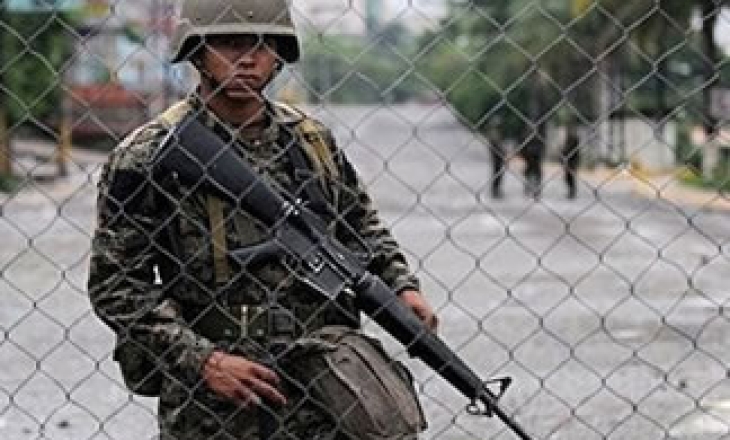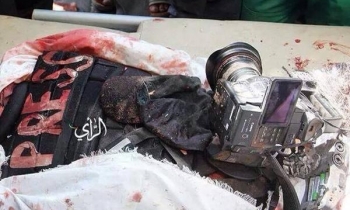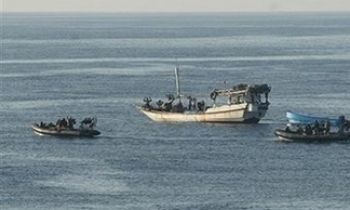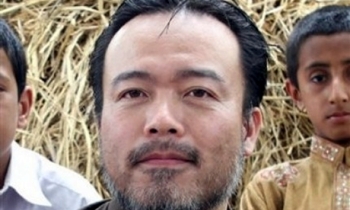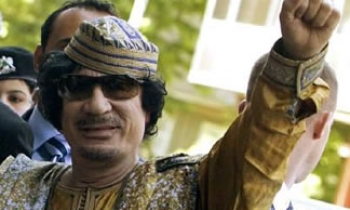Honduran military personnel briefly detained seven journalists, temporarily shut down several local broadcasters, and intermittently blocked the broadcast signals of international news channels in the aftermath of the weekend coup that ousted President Manuel Zelaya, the Committee to Protect Journalists (CPJ) has reported.
On Monday, at least 10 soldiers armed with rifles detained seven journalists working for foreign media inside their hotel in Tegucigalpa, according to international press reports. Adriana Sivori, a reporter for the Venezuela-based regional television network Telesur, her producer María José Díaz, and her cameraman Larry Sánchez were detained along with Nicolás García and Esteban Felix, a video journalist and photographer reporting for the Associated Press, and their two unidentified assistants, AP reported.
Soldiers took the journalists to an immigration office but released them a short time later, according to press reports and CPJ interviews. According to Telesur, authorities confiscated Sivori's equipment and cellphone before releasing her. Honduran military officials said the journalists were detained for "security measures," Telesur reported.
The signals of two Tegucigalpa-based television stations and a provincial radio station were blocked early Sunday morning, according to international press reports and local journalists. The signal of Canal 8, a national, government-owned television station, was reinstated late Monday night, local reporters said. Radio Progreso, a Jesuit-run radio station in the northern city of El Progreso, was back on the air on Tuesday afternoon, reporters told CPJ. However, the private television station Canal 36, which CPJ sources said had supported Zelaya, remained off the air as of Tuesday afternoon.
Cable television transmissions were blocked intermittently on Sunday and Monday, affecting the international networks Telesur and CNN, CPJ reported quoting local reporters. On Sunday, as the coup was under way, local television and radio stations continued usual programming and did not immediately report on the political situation, according to local journalists who asked not to be identified for fear of reprisal. Foreign outlets were the first to report on Zelaya's ouster, they added.
Soldiers went to the headquarters of the daily El Tiempo and the TV station Canal 11 in San Pedro Sula on Sunday and insisted that the journalists stop relaying information coming from members of ousted President José Manuel Zelaya’s government, Reporters sans Frontières (RSF) reported.
Several journalists with the international TV station Telesur and the daily La Prensa, according to RSF, have talked of censorship by military officers who asked them to “moderate” their coverage. Soldiers also threatened to arrest them if they continued to broadcast footage or print photos of the demonstrations in support of Zelaya.
"We are alarmed by the reports of detentions, the blocking of broadcast signals, and the closing of news outlets," CPJ Deputy Director Robert Mahoney said. "We urge those in power to allow all journalists and media outlets to report freely and without fear of reprisal. The Honduran people and international audiences have every right to be fully informed about events following the coup."
“We condemn a coup against a democratically-elected president on principle, especially as it raises concern about respect for basic freedoms including press freedom,” RSF said. “The suspension or closure of local and international broadcast media indicates that the coup leaders want to hide what is happening. The Organisation of American States and the international community must insist that this news blackout is lifted.”
"This crackdown against the media is intolerable and must be widely condemned," said Paco Audije, Deputy Secretary General of the International Federation of Journalists (IFJ). "Fortunately, their attempts to end pluralism and to silence journalists are failing as journalists are determined to provide news on these dramatic events to the people in Honduras."
Elán Reyes Pineda, president of the Honduran Journalists Union, said pro-Zelaya protesters had threatened journalists at street protests and hurled stones and sticks at the offices of several Tegucigalpa outlets. No one was reported injured. Telesur said one of its reporters, Madelein García, received a phone call from someone identifying himself as a military officer, who threatened to detain her if she did not stop reporting on protests in support of Zelaya. Reyes said he spoke to top military officials who promised to ensure journalists' safety.
CPJ's attempts to contact government and military authorities were unsuccessful.
Members of the Honduran army arrested Zelaya on Sunday and put him on a plane to Costa Rica. Zelaya had been seeking a referendum on a constitutional change to eliminate term limits and allow him a second run for the presidency, the international press reported. Later on Sunday, veteran congressional leader Roberto Micheletti was sworn in as the new president.

